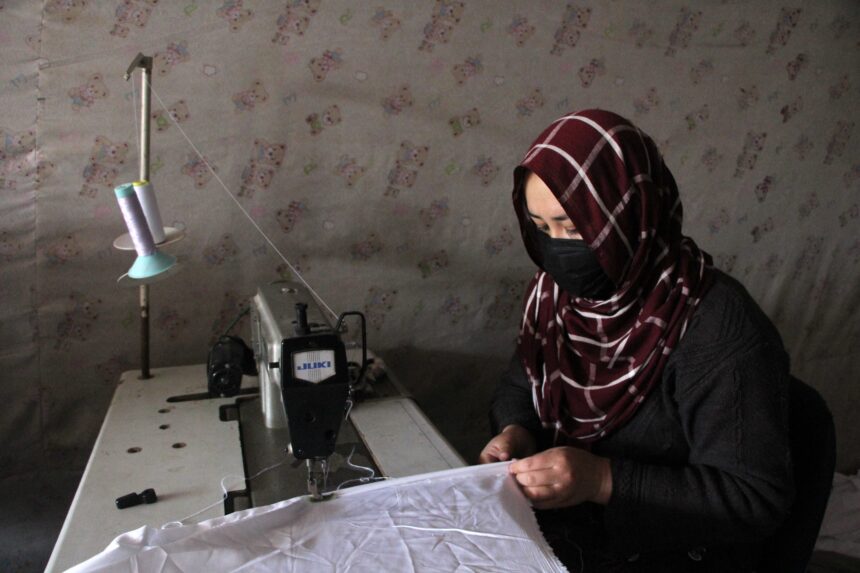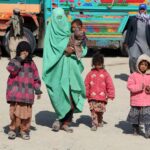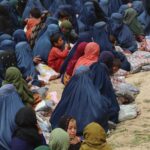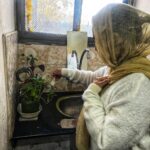One afternoon in Kabul, Afghanistan’s capital, 20-year-old Maryam slips through the alleyways with a notebook hidden beneath her scarf. She is heading to what looks like an ordinary home, but inside, the living room has been transformed into a classroom. Ten young women sit cross-legged on the floor, whispering their responses to the mathematics and English grammar lessons. The curtains are drawn, and their teacher speaks quietly, always alert for a knock on the door.
“I know it’s dangerous,” Maryam told Truthdig, “but if I don’t study, I will lose myself.” She requested only her first name be used, out of fear of the consequences.
When the Taliban recaptured Kabul and returned to power in 2021, they promised a more moderate approach than they had taken in the 1990s. In reality, women and girls have faced what Afghan and Iranian women have called a “gender apartheid.” In December 2022, Afghan authorities banned women from universities, following earlier bans on secondary education. Women were also barred from working in most nongovernmental aid organizations — a devastating blow in a country where such organizations are among the few remaining employers.
According to UNESCO, 1.1 million fewer Afghan girls and boys were attending primary school last year compared to 2021. The World Bank reports that women’s participation in the labor force has fallen by nearly 25% since the Taliban’s takeover. This comes against the backdrop of one of the world’s worst humanitarian crises, with 9.5 million Afghans facing severe food insecurity.
Yet many Afghan women are managing to resist in quiet but powerful ways. In covert classrooms, encrypted online classes and improvised home-based businesses, they are sustaining the possibility of a different future — one that exists in fragments but refuses to die.
Education networks under Taliban restrictions
Education has become one of the most visible battlegrounds for women’s rights in Afghanistan. Despite being shut out of higher education, in cities and rural towns alike, learning has not disappeared.
“We teach as if the future depends on it — because it does,” one female teacher in Herat told Truthdig.
Across the country, organizations like LEARN Afghan have built multilayered systems to teach girls despite the bans. Founded by Afghan women to advance community and girls’ education, LEARN receives donations from abroad and has partnerships with various organizations, such as the Malala Fund.
Pashtana Durrani, an activist originally from Afghanistan and now exiled in the U.S., is one of the founders. “We run community-based schools across 19 provinces, reaching over 10,000 girls daily through local women teachers,” she told Truthdig.
“I know it’s dangerous, but if I don’t study, I will lose myself.”
“Beyond classrooms, we’ve scaled digital and offline tools — from our HELA [Hope for Education and Leadership in Afghanistan] app that works peer-to-peer without the internet, to SIM card-based lessons and radio programming that reaches over 6 million listeners” she said. The HELA app is named after the Pashto word for hope, while the SIM card lessons involve distributing phone numbers to students so they can access lessons and learning materials for free.
“The bans only deepened our resolve,” she added. “We built an ecosystem that no regime can fully silence.”
Most learning now happens through community-based or home schools led by women educators that are often disguised as sewing circles or literacy sessions. “It’s an invisible network that quietly sustains an entire generation’s hope,” Durrani said. Teachers receive small stipends and tablets loaded with offline materials that allow them to continue lessons without connectivity. In villages where even that is impossible, radio lessons and printed materials bridge the gap.
Some of these networks operate with the quiet support of local elders or religious leaders sympathetic to education, providing a fragile layer of protection. But the threat of exposure is constant. “Teachers can be imprisoned or beaten if discovered,” Durrani said. “Classes move every few weeks to stay safe. But despite that fear, the courage is unwavering — teachers continue because they believe education is not a privilege; it’s their duty to the next generation.”
For many Afghan girls, technology is both a lifeline and an act of rebellion. “Our HELA app operates offline via Bluetooth, allowing girls to share lessons directly between devices,” Durrani said. “We’ve also distributed SIM-based content that runs on basic phones. For power, communities share solar chargers — girls often walk miles just to recharge devices. It’s not about convenience anymore; it’s about survival through learning.”
“The bans only deepened our resolve.”
In urban Kabul and Herat, students join encrypted Zoom classes through virtual private networks, to disguise their locations. Others rely on WhatsApp groups where lessons and PDFs circulate under code names like “family recipes” or “wedding lists.” But in rural areas, even access to a working smartphone is a privilege.
Despite the dangers, the hunger for learning is unbroken. “I had a student who was being married off to clear her dead father’s debt. She reached out to us — we cleared the debt. She now works and studies. That shows not only determination, but so much passion and commitment,” Durrani said.
For many, education is no longer about a diploma — it’s about survival, identity and resistance. As one student told Truthdig, “Every time I study, I feel free, even if only for an hour.”
Employment, invisible labor and quiet economics
Employment is another front where women are using creative survival strategies. The Taliban have banned women from most government offices, NGOs and even beauty salons — once the rare space for female community and income. Yet economic necessity forces women to work, often in the shadows.
Many have turned to home-based businesses. Kitchens become bakeries; bedrooms double as tailoring workshops. “The [anti-beauty salons] decree broke many women,” said Shabana, a former salon owner in Kabul. “But then we began selling cosmetics from home — quietly, door to door. They can’t stop us all.”
“Afghan women are redefining what work means,” Durrani said. “Many have shifted to home-based tailoring, online tutoring and handicraft production. Through LEARN, we’re training women to manage micro-businesses and sell locally produced goods. Some are even using basic digital tools to find freelance work or connect with diaspora buyers.”
On platforms like WhatsApp or Telegram, informal market channels circulate photos of embroidered dresses, homemade sweets or crochet work posted under pseudonyms. Male relatives often act as intermediaries for deliveries, but most people in the community know who is really doing the work.
“Afghan women are redefining what work means.”
“I run my business from home,” said Fatima, an entrepreneur in Mazar-i-Sharif. “Officially, it’s my brother’s, but everyone in our neighborhood knows I am the one sewing and selling.”
Education and digital literacy have become directly tied to women’s survival. “Women who can read or use a smartphone can manage money, access health information or run small online businesses,” Durrani said. “Our digital literacy programs teach everything from Excel to social media marketing — skills that allow women to quietly sustain income while staying safe. Even minimal digital access can mean the difference between dependence and dignity.”
For some, these opportunities are also psychological lifelines. “Working, even in secret, gives us purpose,” said Zarmina, a former NGO worker now running an online tutoring group. Like others, her full name has been withheld for her safety. “It reminds us that we are still capable, still valuable.”
According to data from the International Labor Organization, women’s employment in Afghanistan fell by an estimated 25% to 28% in the first year of Taliban rule, compared with mid-2021 levels. Those levels were already very low; in 2020, only 16.5% of women were participating in the labor force. That rate had dropped to around 5% by 2024, one of the lowest in the world.
But that statistic conceals a growing informal economy, an underground network of women’s work beyond domestic labor that financially sustains households. “It’s invisible work,” Durrani said, “but it’s holding entire families together.”
The role of international solidarity
Visibility can be dangerous. Women who attempt to work publicly can face harassment or arrest. Taliban patrols frequently raid women-run businesses, accusing them of immorality. In February, for example, authorities raided and shut down a women’s radio station and arrested two employees.
Hence, international attention can be important in preventing crackdowns on women. But Durrani argues that the global community must listen to and support local strategies, rather than impose outside solutions. “We don’t need foreign armies,” she said. “We need solidarity, resources and platforms to be heard.”
International NGOs operate under extreme constraints. Some support different types of learning, while others deliver emergency aid directly to women-led households, circumventing Taliban restrictions. Yet many have been forced to scale back operations after the regime banned female employees in 2022. Without women in their teams, aid organizations struggle to reach the very people they aim to help.
Still, local activists continue to find ways around these barriers. Women-led networks often disguise their work through neutral community projects — “nutrition programs,” “health awareness workshops” or “Quranic literacy sessions” — while embedding education and empowerment into their curricula.
“We’ve learned to survive systems designed to erase us.”
“Afghan women are experts at camouflage,” Durrani said. “We’ve learned to survive systems designed to erase us.”
This struggle is resonating beyond Afghanistan’s borders. Feminist movements across Iran, Sudan and Myanmar have drawn parallels between their own fights for bodily autonomy and Afghanistan’s gender apartheid.
Activists in exile through groups like the Afghanistan Law & Political Science Association are also building bridges; translating lessons into Persian, Dari and English, connecting underground educators to cloud-based libraries and lobbying international donors to bypass the Taliban entirely. These efforts, though small, help sustain morale and visibility for women still inside the country.
For Durrani, international solidarity means more than sympathy — it means practical partnership. “Afghan women don’t need saving,” she said. “We need the world to believe in our strategies — to fund them, amplify them and protect them. We are already saving ourselves.”
A generation at risk and in defiance
“They can close schools, but they cannot close minds,” said Maryam, the student in Kabul. “Every lesson we learn is a small rebellion.”
Durrani echoed that sentiment, “Hope comes from their refusal to give up. Afghan women have learned to rebuild from nothing, over and over. Even in silence, they’re strategizing, teaching, creating. I see hope in every girl who opens a textbook in secret, in every mother who teaches her daughter by candlelight, and in every teacher who continues despite fear.”
Back in Kabul, Maryam finishes her secret class and carefully tucks away her notebook. She dreams of becoming a doctor, though for now her studies remain confined to a dimly lit room. Outside, the wind carries the echo of a city forced into silence — yet behind many of the closed doors, there are voices refusing to fade.
In one of those homes, a young teacher folds the blanket she used as a blackboard, and whispers a hope.
“Maybe one day,” she said softly, “we will study in the sunlight again.”







